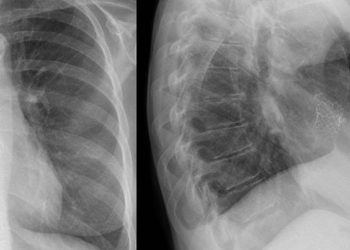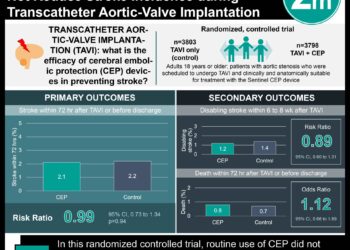Coronary artery bypass grafting reduces rate of myocardial infarctions compared to percutaneous coronary intervention for left main coronary artery disease
1. Although there was no significant difference seen in 5-year all-cause death between PCI and CABG patients, a Bayesian analysis suggests a likely small difference (<0.2%) in favour of CABG.
2. Rates of myocardial infarction and repeat revascularization were more significantly common in patients who had undergone PCI.
Evidence Rating Level: 1 (Excellent)
Study Rundown: Both percutaneous coronary intervention (PCI) with drug eluting stents and coronary artery bypass grafting (CABG) are first-line strategies for revascularization of left main coronary disease. However, it is not clear whether one method is more effective than the other for patients with low or intermediate coronary anatomical complexity. This study analyzed data from four existing randomized controlled trials comparing PCI versus CABG in hopes of better informing physician decisions. The primary outcome was 5-year all-cause mortality. Results showed no significant difference between rates of all-cause, cardiovascular, and non-cardiovascular mortality between the two intervention groups. However, significant differences were seen in rates of spontaneous myocardial infarction and repeat revascularization, which were higher in the PCI group. The rate of stroke was lower in the PCI group in the first year after randomization. A major limitation of this study includes the age of the data, as two of the RCTs are around 10 years old. Nonetheless, this study provides an excellent summary of PCI versus CABG which can help guide shared decision making between patients and providers.
Click to read the study in The Lancet.
Relevant Reading: PCI and CABG for Treating Stable Coronary Artery Disease: JACC Review Topic of the Week
In-Depth [meta-analysis]: This study was a meta-analysis of patient data of four randomized control trials (n=4394 overall): SYNTAX (n=705), PRECOMBAT (n=600), NOBLE (n=1201), and EXCEL (n=1905). Three of the studies enrolled patients based on an eligibility criterion of left main coronary artery disease. SYNTAX included patients with multivessel coronary artery disease, but only the cohorts with left main coronary artery disease were included in this study. Patients were randomly assigned to receive either PCI or CABG, with 2197 patients in each group. The median age was 66 years and 76.7% were male. The primary outcome was a Kaplan-Meier estimate of all-cause death which was reported by each study in a period of at least 5 years.
The estimate for all-cause death was 11.2% (95% CI 9.9 to 12.6) in the PCI group and 10.2% (9.0 to 11.6) in the CABG group, giving a calculated hazard ratio of 1.10 (0.91 to 1.32; p=0.33). Secondary outcomes included rate of cardiovascular death for 5 years, which were 6.2% in PCI and 5.9% in CABG. The cumulative all-cause death incidence was originally higher in the first year for CABG patients but crossed after year 1-5. A significantly higher risk of spontaneous myocardial infarction (6.2% vs. 2.6%, p<0.0001) and repeat revascularization (18.3% vs. 10.7%, p<0.0001) was seen in the PCI versus CABG groups, respectively.
Image: PD
©2022 2 Minute Medicine, Inc. All rights reserved. No works may be reproduced without expressed written consent from 2 Minute Medicine, Inc. Inquire about licensing here. No article should be construed as medical advice and is not intended as such by the authors or by 2 Minute Medicine, Inc.







